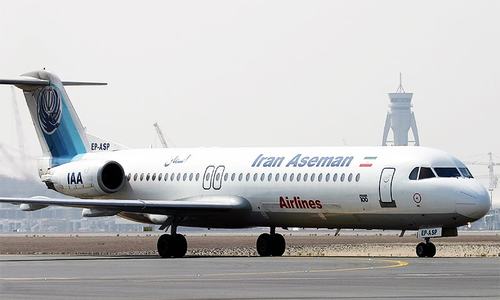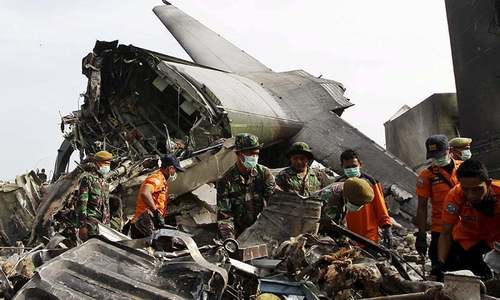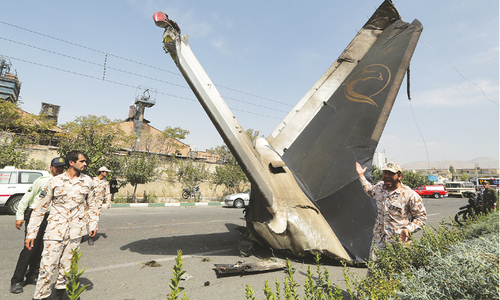A Ukrainian airliner burst into flames shortly after take-off from Tehran on Wednesday, killing all 176 people aboard in a crash that an initial report blamed on engine failure.
Debris and smouldering engine parts were strewn across a field around 10 km (six miles) from Imam Khomeini airport as rescue workers with face masks retrieved bodies of the victims.
Ukraine's embassy in Iran, citing preliminary information, said the Boeing 737 suffered engine failure and the crash was not caused by "terrorism".
Carrier Ukraine International Airlines said it was doing everything possible to confirm the cause, and the investigation would also involve Boeing and Ukrainian and Iranian authorities. It was the Kiev-based airline's first fatal accident.
Ukraine President Volodymyr Zelenskiy said all on board had died.
"My sincere condolences to the relatives and friends of all passengers and crew," he said in a statement.
He warned against speculation about the crash.
"I ask everyone to keep from speculating and putting forth unconfirmed theories about the crash," he wrote on Facebook, as he cut short a vacation in Oman and flew back to Ukraine.
"The fire is so heavy that we cannot do any rescue [...] we have 22 ambulances, four bus ambulances and a helicopter at the site," Pirhossein Koulivand, head of Iran's emergency services, told Iranian state television.
Ukraine's prime minister and Iranian state TV said 167 passengers and nine crew were on board. Iranian TV said 32 of those on board were foreigners.
Ukrainian Foreign Minister Vadym Prystaiko said the victims included 82 from Iran, 63 Canadians, 11 Ukrainians, 10 Swedes, three Germans and three Britons. Most passengers were in transit, the airline said.
Iranian media quoted a local aviation official as saying the pilot did not declare an emergency.
Iranian TV said the crash was due to unspecified technical problems. State broadcaster IRIB said on its website that one of the plane's two black boxes — the flight data recorder and the cockpit voice recorder — had been found.
PM, president express sorrow
President Dr Arif Alvi and Prime Minister Imran Khan expressed their grief and sorrow over the loss of lives in the Ukrainian airliner's crash.
"Our thoughts and prayers are with the bereaved families and all those who have lost their loved ones," the Foreign Office spokesperson said in a press release.
It said the government and people of Pakistan offered their sympathies and condolences to the governments and people of Ukraine, Iran, Canada, Sweden, Afghanistan, Germany and the United Kingdom, whose nationals were reportedly on board the flight.
Good safety record
The plane that crashed was a three-year-old Boeing 737-800NG en route to Kiev, air tracking service FlightRadar24 said.
"The last scheduled maintenance of the aircraft took place on 06 January, 2020," the airline said. A spokesman for the manufacturer said it was gathering more information.
The 737-800 is one of the worlds most-flown models with a good safety record and does not have the software feature implicated in crashes of the 737 MAX. Boeing grounded its 737 MAX fleet in March after two crashes that killed 346 people.
The 737-800's twin engines are made by CFM International, a US-French venture co-owned by General Electric and Frances Safran.
Modern aircraft are designed and certified to cope with an engine failure shortly after take-off and to fly for extended periods on one engine. However, an uncontained engine failure releasing shrapnel can cause damage to other aircraft systems.
Under international rules overseen by the United Nations, Iran is responsible for leading the crash investigation.
Ukraine would be involved and the United States would usually be accredited as the country where the jet was designed and built. France, where the engine maker CFM has half its activities, may also be involved.
With relations between Washington and Tehran mired in crisis , there was no immediate word on whether the US National Transportation Safety Board would be involved in the investigation.
The NTSB usually invites Boeing to give technical advice in such investigations.
'Won't give Americans black boxes'
Meanwhile, Iran's aviation authority said it would not hand over to Americans the recovered black boxes of the crashed Boeing 737.
“We will not give the black boxes to the manufacturer (Boeing) and the Americans,” Iran Civil Aviation Organisation head Ali Abedzadeh said, quoted by Mehr news agency.
“It's not yet clear which country the black box will go to for the investigation,” he added.
Following the crash of Ukraine International Airlines flight PS752 shortly after takeoff from Tehran on Wednesday, Iran said it had recovered the Boeing 737's two black boxes.
Abedzadeh said that based on global aviation rules, it was the right of the country where air crashes occur to carry out the investigation.
“This accident will be investigated by Iran's aviation organisation but the Ukrainians can also be present during the incident's investigation,” he added.
Under the rules of the International Civil Aviation Organisation, of which Iran, Ukraine and the United States are all members, air crash investigations are led by the country where the accident occurred.
However, according to aviation experts, the countries that are capable of analysing black boxes are few — notably Britain, France, Germany and the United States.
France's Accident Investigation Bureau (BEA), which handles air crash investigations, said it had not received any request for help from the Iranian authorities after the crash.
















































